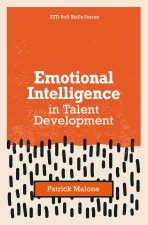ATD Blog
Emotional Intelligence in Talent Development: Q&A With Patrick Malone
Tue Oct 05 2021

Bookmark

For TD professionals to succeed, they must be comfortable with all aspects of working with people. The best tool for their success is emotional intelligence. Part of the ATD Soft Skills Series, Emotional Intelligence in Talent Development is your resource for developing your emotional intelligence skills. Expert Patrick Malone explains emotional intelligence and explores its five dimensions: self-awareness, self-regulation, motivation, empathy, and social skills.
1. Why Did You Write This Book?
Talent development professionals play an important role for so many people in so many industries. With this book, I hope to arm TD professionals with the tools necessary to succeed not only from their expert side but also from their emotional side. We spend a lot of time developing our technical skills and often toss the soft skills to the side when, in reality, they are the primary determinants of our success and failure not only in our professions but in our lives in general.
No doubt about it—achieving emotional intelligence is tough. But when we hone those practices, we gain the ability to see ourselves as we really are and not as we project ourselves on social media. Emotional intelligence helps us to relate better to others, handle conflict more effectively, communicate well, and be more inclusive and welcoming. It’s a continuous journey. Throughout the book, I ask the reader to ponder various things about themselves and others to start down the path to emotional intelligence.
2. How Does EI Show Up in Our Professional Lives?
We are often told to leave emotions out of our professional environments. The fact of the matter is that emotions are as real and pure as it gets. Emotions are never irrational. Sometimes our reactions to our emotions can be, however. So, it is important to build strong self-awareness skills, which allow us to recognize our emotions, followed immediately by robust self-management, which allows us to manage our responses.
Let’s say, for example, we know that we get defensive when we feel like the quality of our work is being questioned. Since we know that is the way we are going to feel, we have a good sense of what might happen when the inquiry begins. As a result, instead of responding quickly with words that we may later regret, we can take a deep breath, pause, and respond professionally and appropriately. It’s all about being able to manage ourselves.
3. What Are Some of the Barriers to EI in Talent Development?
One of the biggest barriers to EI in talent development is simple fear. We build our careers with a strong base of expertise. We build a knowledge base that allows us to master a set of skills or competencies. This allows us to get our first job, get promoted, and contribute to our organizational mission. We gain a comfort level that is frightening to stray too far from.
There’s a big unknown factor here. Emotional intelligence is more fluid and sophisticated to measure than curriculum development or project management. EI has to do with the soul. As such, it can be a little frightening for individuals to take the time to become more self-aware or to express empathy in a difficult work situation. In chapter 1, I offer a list of words to ask the realtor to see what identifies with them. It is a great way to start uncovering the internal barriers we may face to achieving emotional intelligence.
4. Are There Organizational Benefits to Focusing on EI?
Studies have shown that organizations with individuals who have high levels of emotional intelligence achieve their goals much more readily than organizations with more toxic work environments. Emotionally intelligent workforces relate better to one another, build trust, and nurture innovation. People are more open, welcoming, inclusive, and caring, and this contributes to a stronger organizational culture.
Innovation is an important benefit as well. As we become more emotionally intelligent and more connected to one another, we feel safer asking difficult questions or pondering solutions to problems that no one would’ve ever considered before. This is the kind of innovation we need in talent development and so many other industries, and it contributes directly to the organization’s bottom line.
5. Can You Offer a Few Examples of How EI Can Inform Our Daily Lives?
When you think about what we all face throughout a typical day, it’s not hard to find examples of how emotional intelligence can inform our lives. Both personally and professionally, we all face a significant amount of stress. Many of us struggle with time management skills, communication, or feeling overwhelmed and resort to multitasking. Emotional intelligence gives us the tools to recognize these situations in ourselves and others. We can then take a step back, take a deep breath, and examine the situation with a fresh set of eyes. This allows us to be more sensitive to our needs and the needs of others in our lives.
Throughout the book, I offer several mini-reflection exercises and things to think about. I also wanted to include space for the reader to write down notes about what they’re thinking and feeling as they read through the material. This is a fantastic way to begin a mindful practice of self-assessment. Before you know it, you are working your way into a routine that will reduce anxiety and open the doors to new possibilities through all the challenges we face in our daily lives.
6. What Should We Be Asking Ourselves About Going Down the EI Path?
One of the first things to consider is whether we are willing to let go of the pre-existing mindsets we have lived with for so many years, such as always falling back to our expertise and comfort zones. This is a huge challenge. We gain success through our past practice, and it’s easy to want to rely on that practice as we move forward. The brain likes the consistency, constancy, and predictability. I’m not saying we forget where we came from or the skills that got us to where we are. I’m suggesting opening the mind to new thoughts and new neural pathways that can make us more creative and happier.
We also want to ask ourselves what our support systems look like. Some have very large families, others smaller families but lots of friends, and for some friends that are their family. These people can be very helpful as we proceed down the path of self-discovery, or should I say self-rediscovery! It is always nice to talk to and confide in someone as we are asking ourselves difficult questions and exploring new horizons.
The bottom line is that those with strong emotional intelligence capabilities are more effective professionals. They will always connect well with others, build more effective teams, influence, and inspire. This is what transcends the technical aspects of our work. It’s what brings us together in a synergistic fashion to accomplish our organizational missions. And when you look at organizations today, they are spending more money developing their teams’ soft skills. This is because they know that technical capacity is easy to build. It may be a complex skill set, but given the cognitive capacity to master that skill, it’s not a difficult thing to accomplish. Emotional intelligence skills are different. They require vulnerability and openness. They require us to be human. Organizations know that it is the latter that is the secret for long-term organizational performance.
So, think hard about what it is you are looking for, surround yourself with people who care about you, and start the journey!
About the Author
Patrick Malone is director of Key Executive Leadership Programs at American University in
Washington, DC. He is a frequent guest lecturer on leadership and organizational dynamics and
has extensive experience working with government leaders. Patrick’s research, teaching, and
scholarship include work in public sector leadership, executive problem solving, organizational
analysis, ethics, and public administration and policy. He is a retired US Navy captain, having spent 22 years in senior leadership and policy roles.
About ATD and ATD Press
The Association for Talent Development (ATD) is the world’s largest association dedicated to those who develop talent in organizations. ATD’s members come from more than 120 countries and work in public and private organizations in every industry sector. ATD Press publications are written by industry thought leaders and offer anyone who works with adult learners the best practices, academic theory, and guidance necessary to move the profession forward. For more information, visit td.org/books.
Emotional Intelligence in Talent Development
ISBN: 9781952157493| 136 Pages | Paperback
td.org/book/emotional-intelligence-in-talent-development
To order books from ATD Press, call 800.628.2783.
To schedule an interview with Patrick Malone, please contact Kay Hechler, ATD Press senior marketing manager, at khechler@td.org or 703.683.8178.
More from ATD

